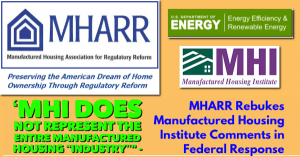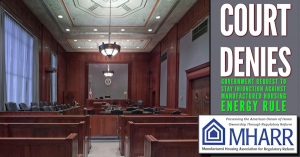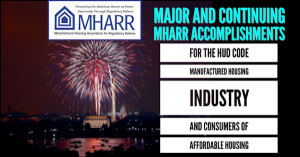‘MHI Does Not Represent Entire Industry’ Manufactured Housing Assoc Slams Manufactured Housing Institute on Energy Rule

See report at: https://manufacturedhousingassociationregulatoryreform.org/mhi-does-not-represent-the-entire-manufactured-housing-industry-mharr-rebukes-manufactured-housing-institute-comments-in-federal-response/
Manufactured Housing Association for Regulatory Reform (MHARR) Decries MHI “Lifeline” on Court-Rejected DOE MH Energy Rule for New Manufactured Homes
The Texas Manufactured Housing Association’s (TMHA) VP Rob Ripperda said, “The factory-built model only works when you can source your materials [for manufactured homes] at scale. If a standard product is no longer allowed because of a regulatory change and the mandated substitute isn’t available at the necessary quantities, you’ve got the makings of a slowdown.”
MHARR Files Comments Clarifying MHI’S Presumptive Statement Regarding Proposed DOE Energy Standards
The Manufactured Housing Association for Regulatory Reform (MHARR) has filed supplemental comments with the U.S. Department of Energy (DOE) in its rulemaking docket for a Draft Environmental Impact Statement (EIS) concerning proposed manufactured housing “energy conservation” standards. MHARR’s supplemental comments (copy attached), filed on March 4, 2022, correct and clarify inaccurate and presumptive characterizations contained in a so-called “Industry Proposal for Energy Efficiency Standards for Manufactured Housing,” attached as an “Appendix” to last-minute comments filed in the same rulemaking docket by the Manufactured Housing Institute (MHI).
In relevant part, “Appendix I” to MHI’s comments states that “MHI and the industry…” developed an “alternative manufactured housing energy standard” as set forth in the Appendix, “to provide a concrete example showing how a judicious increase in energy requirements can result in substantially improved energy efficiency and greater affordability.” (Emphasis added).
MHARR’s supplemental comments strongly object to any characterization of the MHI proposal as an “industry” initiative. First, MHI does not represent the entire manufactured housing “industry.” Any characterization of the MHI “alternative” standards proposal as an “industry” proposal, therefore, is false and misleading. Second, as MHARR’s initial comments in the Draft EIS rulemaking and in the preceding DOE manufactured housing energy standards rulemaking show, mainstream, modern HUD Code manufactured homes are already energy efficient, with average monthly energy costs below those of site-built homes for all tracked energy types. There is no basis, rationale, or need, accordingly, for an “increase” in manufactured housing energy requirements -- “judicious” or otherwise – and no representative of any part of the industry should state, suggest, or imply otherwise, particularly when DOE’s energy proposal fails to meet the statutory criteria of both the Energy Independence and Security Act of 2007 or the Manufactured Housing Improvement Act of 2000.
MHARR acted immediately to disavow and correct this presumptuous misstatement insofar as it represents yet another in a string of strategic errors (including, but not limited to, one-sided procedural and substantive “compromises”) that have enabled DOE regulators to sidestep full compliance with EISA, the 2000 reform law and other applicable law, while repeatedly proposing draconian and destructive standards that would undermine manufactured housing as the preeminent source of non-subsidized, affordable homeownership for lower and moderate-income American families.
Particularly in light of the recent decision in Louisiana v. Biden [Case#2:21-CV-01074-W.D.La.Feb.11.2022], imposing a nationwide injunction against the DOE rule and others which rely in part on federal estimates of the “Social Cost of Carbon,” now is not the time to throw an undeserved “lifeline” to DOE regulators.
MHARR will continue to carefully monitor ongoing activity with respect to both the DOE manufactured housing energy rule and the related pending Social Cost of Carbon litigation, and will provide further updates as warranted. These matters will also be addressed in detail at the upcoming MHARR Board of Directors meeting.
cc: Other Interested HUD Code Manufactured Housing Industry Members and Consumer Groups ##
Attached MHARR comments dated 3.4.2022.
U.S. Department of Energy
Office of Energy Efficiency and Renewable Energy Building Technologies Program 1000 Independence Avenue, S.W.
Washington, D.C. 20585
Re: Draft Environmental Impact Statement for Proposed Energy
Conservation Standards for Manufactured Housing (DOE/EIS 0550)
Dear Sir or Madam:
The Manufactured Housing Association for Regulatory Reform (MHARR) filled comments in this docket on February 25, 2022 opposing the Draft Environmental Impact Statement (EIS) published by the U.S. Department of Energy (DOE) on January 14, 2022. MHARR also filed comments on October 25, 2021 and November 22, 2021 opposing the proposed manufactured housing energy standards published by DOE on August 26, 2021 and modified on October 26, 2021.
On February 28, 2022, another manufactured housing industry group, the Manufactured Housing Institute (MHI), filed comments in the present docket. Among other things, those comments include and incorporate a document captioned “Appendix I – Industry’s Proposal for Energy Efficiency Standards for Manufactured Housing.” In part, that document states: “MHI and the industry’s goal in developing this alternative manufactured housing energy standard was to provide a concrete example showing how a judicious increase in energy requirements can result in substantially improved energy efficiency and greater affordability.”
We are writing to ensure that the administrative record is abundantly clear that:
(1) MHI does not represent the entire manufactured housing industry;
(2) MHARR was not consulted with respect to the aforesaid misnamed “industry” proposal;
(3) MHARR does not support or endorse the aforesaid misnamed “industry” proposal and would not support its adoption or consideration; and
(4) MHARR, as set forth in its previously-filed comments, would not accept or support any proposed manufactured housing “energy conservation” rule that is developed outside of the Manufactured Housing Consensus Committee process prescribed by the Manufactured Housing Improvement Act of 2000.
We ask that this communication be included in the administrative record of the aforesaid proceeding in order to prevent any misrepresentation or misunderstanding regarding alleged “industry” support for the aforesaid MHI “Appendix 1” document.
Sincerely,
Mark Weiss
President & CEO##
MHARR's repeatedly called on independents to join them in efforts to fight for manufactured housing rights.##
https://manufacturedhousingassociationregulatoryreform.org/mharr-releases-study-recommending-independent-collective-representation-for-post-production-sector/
Mark Weiss, J.D.
Manufactured Housing Association for Regulatory Reform-MHARR
+1 202-783-4087
email us here
Visit us on social media:
Facebook
Twitter
LinkedIn
Legal Disclaimer:
EIN Presswire provides this news content "as is" without warranty of any kind. We do not accept any responsibility or liability for the accuracy, content, images, videos, licenses, completeness, legality, or reliability of the information contained in this article. If you have any complaints or copyright issues related to this article, kindly contact the author above.


